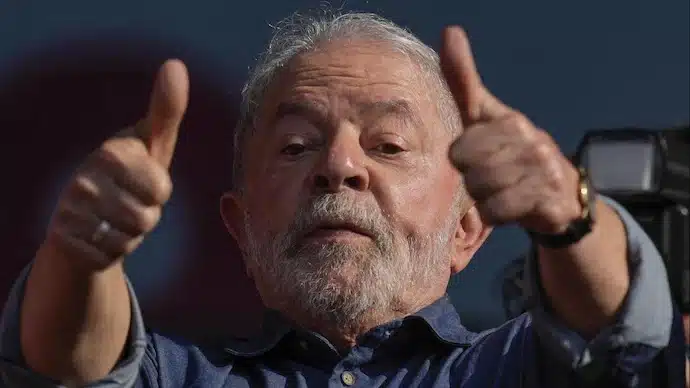Veteran Luiz In cio Lula da Salva is set to become the president for the third time as he defeated the present president Jair Bolsonaro in an extremely tight election. Twenty years after winning the election for the first time, the leftist leader jas made a return after four years of far-right politics.
It was a very closely fought contest as da Silva got 50.9 per cent votes compared to Bolsonaro’s 49.1. One can understand how divided the ideology of the country is in current times.
Interestingly, it is for the first time in the democratic history of Brazil since 1985, that an incumbent President didn’t win the election.
In his speech given from the Sao Paolo hotel, da Silva said that the Brazilian public was the real winner of the day and its not just his victory but the victory of the “democratic movement”
Da Silva doesn’t want just leftists in his government. Rather he is thinking of bringing more centrists and even a few rightists as well.
Lula Da Salva: A seasoned leader

Luiz Inácio Lula da Silva was born on 27 October 1945 in Caetés in the Northeast of Brazil. He was the second youngest child of Aristides Inácio da Silva and Eurídice Ferreira de Melo.
He started his career as a metalworker and trade unionist.
He was active during the military dictatorship in Brazil, where he led several workers’ strikes between 1978 and 1980.
He had a prominent role in starting the Workers’ Party in 1980. He was the main leader in the Diretas Já movement, which asked for democratic rights.
In 1986 he was elected as a federal deputy in the São Paulo state with the most votes across the nation. In 1989 he lost to Fernando Collor de Mello in the second round of the Presidential election. This was the first time he ran for president. He lost in 1994 and 1998 to Fernando Henrique Cardoso.
Eventually, he won the 2002 presidential election, when he defeated José Serra in the second round. He became the 35th President of Brazil. In 2006, he got re-elected beating Geraldo Alckmin in the second round. From 1st January onwards, he will be the 39th President of the country.
In July 2017, Lula’s name came into the money laundering and corruption and he was convicted in the trial. This resulted in sentencing him to 9 and a half years. Interestingly, Sergio Moro, who was the federal judge in this trial later became Minister of Justice and Public Security in Bolsonaro’s regime.
Lula attempted to run into the was arrested in April 2018 and was in jail for more than 500 days. He tried to contest the 2018 election but was disqualified under Brazil’s “Clean Slate” Law.
Supreme Court Justice Edson Fachin in April 2021 acquitted Lula on the basis that the court that gave the decision didn’t have proper jurisdiction for the case and the judge was biased. His charges were nullified and he was again eligible to fight elections.
Challenges for Da Salva

There are challenges for Da Salva like polarization, slow economic growth and rising inflation. It will be interesting what steps he takes to curb them
Latin America is seeing the return of leftist governments. Apart from Brazil, the trend saw the leftists’ victory in the countries like Chile, Colombia and Argentina.
It was the closest election ever fought in Brazil with just 2 million votes separating the two. Before this, the closest was in 2014 with a gap of 3.4 million votes.
Da Silva, who last served from 2003-10 shall be beginning the term on January 1.
According to Thomas Traumann, an independent political analyst, the Brazil election results are similar to Biden’s 2020 victory, stating that da Silva is going to lead a heavily divided nation.
“People are not only polarised on political matters but also have different values, identities and opinions. What’s more, they don’t care what the other side’s values, identities and opinions are,” says Traumann.












